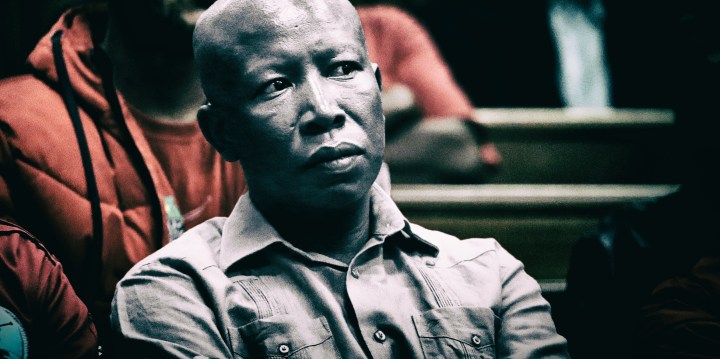THE MALEMA TRESPASS RULING
Judge: ‘We may have a culture of robust political debate, not a culture of fear marked by the incitement of criminality’

In December 2018 Julius Malema filed two applications challenging legislation after he was charged under the Riotous Assemblies Act and the Trespass Act. On Thursday 4 July 2019 the Pretoria High Court dismissed his appeal against the charges of incitement to trespass, but found Section 18(2)b of the Riotous Assemblies Act to be unconstitutional.
The Pretoria High Court has ruled that the crime of incitement is “neither overboard nor of limitless scope”. This is the gist of a ruling against Julius Malema’s application to court seeking declaratory relief on a charge of inciting trespassing under the Trespass Act.
Malema was charged under the act after he told supporters to occupy land in Bloemfontein and in Newcastle in 2014 and 2016.
“Properly understood, the crime of incitement is intention by word or conduct to influence the mind of another in furthering of committing a crime,” said Judge Aubrey Ledwaba, leading a full Bench of the court.
Malema argued that his supporters are capable of making up their own minds whether to occupy land or not, therefore they may or may have not occupied land after he said that they should.
“The question is whether the inciter believed that the act incited would, all things considered, be unlawful, notwithstanding that the incitee might be ignorant to the fact that they are committing a crime,” reads the judgment.
Malema had argued that his conduct did not incite trespassing, but did incite occupation. Malema argued that “someone who is an ‘unlawful occupier’ under PIE (Prevention of Illegal Eviction from and Unlawful Occupation of Land Act) is not guilty under the Trespass Act”. Therefore “(he) incited no crime by calling for the occupation of land”, reads the judgment.
The court disagreed and found that this was “a thinly veiled attack on the constitutionality of the Trespass Act”. This appeal was dismissed.
Malema argued that the charge criminalised free expression which is protected by the Constitution.
The court acknowledged that “the right to freedom of expression is guaranteed so that we may have a culture of robust political debate, not a culture of fear marked by the incitement of criminality”.
“To equate robust political rhetoric with the incitement of criminal acts is, sadly, to say little about the quality of our political discourse,” reads the judgment.
The judges ordered Malema to challenge the charge of trespassing in the lower court.
Malema’s application was also challenging the constitutionality of section 18(2)(b) of the Riotous Assemblies Act. Malema argued that it was unconstitutional to charge and sentence someone for inciting a crime as though they had committed the crime. The court ruled that this section was unconstitutional.
“The Riotous Assemblies Act was passed in response to the Freedom Charter. The Act was used to try (Nelson) Mandela,” Julius Malema told journalists inside the courtroom after the ruling.
Section 18(2)(b) states that a person who incites people to commit violence can be charged and sentenced as though they had committed the act.
“It ought to be (two) different things,” Malema told journalists in the courtroom.
Ledwaba ruled that sentencing someone “as if they had actually committed the crime is unconstitutional”.
“The mere possibility of criminal sanction is enough to successfully dissuade one from inciting another to commit a crime. It is also difficult to find a rational reason why a person who incites the commission of a crime should be punished to the same extent as the person who committed the crime,” reads the judgment.
Malema saw this section of the judgment as a victory.
“We’re extremely happy that the court has confirmed that we’re correct,” said Malema outside court.
Malema told reporters that they would approach the Constitutional Court for the Riotous Assemblies Act to be declared unconstitutional in its entirety. In court, Malema was supported by EFF members, Vuyani Pambo, EFF secretary-general Godrich Gardee and EFF’s spokesperson Mbuyiseni Ndlozi.
“We believe that it (the Riotous Assemblies Act) doesn’t have a place in a democratic society.”
At the EFF’s 2014 elective conference in Malema encouraged his supporters to occupy vacant land.
In 2016 in KZN, Afriforum claimed that Malema incited his supporters to occupy white-owned land.
The Bloemfontein case has been postponed to November 2019. For the Newcastle case, Malema is back in court on Monday 8 July 2019.
In a challenge to the law around protests and gatherings, the Constitutional Court ruled in 2018 that section 12(1)(a) of the Gatherings Act was unconstitutional. This section required conveners of a demonstration to notify the municipality of the demonstration; failure to do so was considered a criminal offence.
In 2013 a demonstration (which includes 15 or fewer people) was organised by the Social Justice Coalition.
The demonstration grew bigger as more people joined and the demonstration became a gathering (which includes more than 15 people). Ten people were charged as “conveners” of the gathering and were found not to have given notice of the gathering.
In 2018 the 10 approached the Constitutional Court to confirm that section 12(1)(a) of the Gatherings Act limited their right to assembly.
The court ruled that it was unconstitutional and that “people who lack political and economic power have only protests as a tool to communicate their legitimate concerns”. The court also pointed out that an alternative measure could be fining people for failure to notify the municipality of demonstrations instead of using the threat of criminal records. DM

















 Become an Insider
Become an Insider